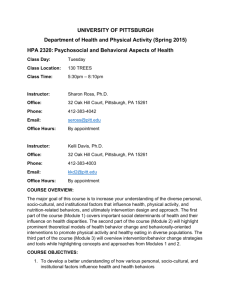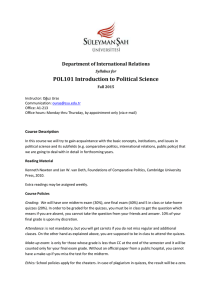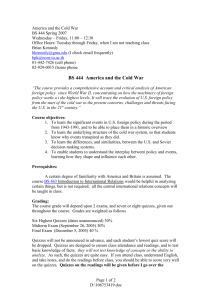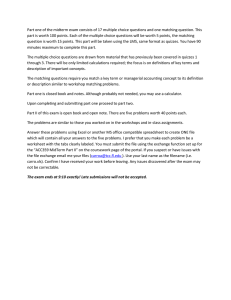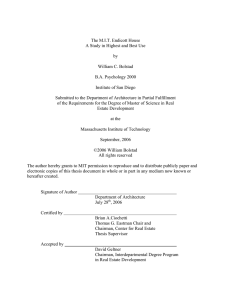Syllabus
advertisement
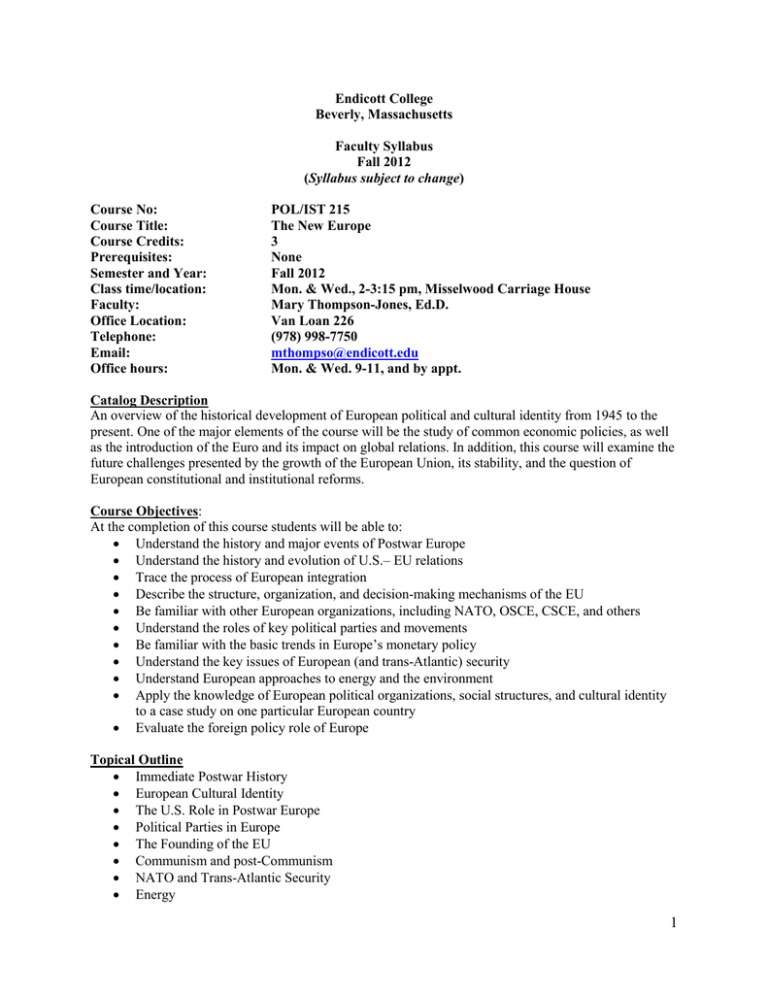
Endicott College Beverly, Massachusetts Faculty Syllabus Fall 2012 (Syllabus subject to change) Course No: Course Title: Course Credits: Prerequisites: Semester and Year: Class time/location: Faculty: Office Location: Telephone: Email: Office hours: POL/IST 215 The New Europe 3 None Fall 2012 Mon. & Wed., 2-3:15 pm, Misselwood Carriage House Mary Thompson-Jones, Ed.D. Van Loan 226 (978) 998-7750 mthompso@endicott.edu Mon. & Wed. 9-11, and by appt. Catalog Description An overview of the historical development of European political and cultural identity from 1945 to the present. One of the major elements of the course will be the study of common economic policies, as well as the introduction of the Euro and its impact on global relations. In addition, this course will examine the future challenges presented by the growth of the European Union, its stability, and the question of European constitutional and institutional reforms. Course Objectives: At the completion of this course students will be able to: Understand the history and major events of Postwar Europe Understand the history and evolution of U.S.– EU relations Trace the process of European integration Describe the structure, organization, and decision-making mechanisms of the EU Be familiar with other European organizations, including NATO, OSCE, CSCE, and others Understand the roles of key political parties and movements Be familiar with the basic trends in Europe’s monetary policy Understand the key issues of European (and trans-Atlantic) security Understand European approaches to energy and the environment Apply the knowledge of European political organizations, social structures, and cultural identity to a case study on one particular European country Evaluate the foreign policy role of Europe Topical Outline Immediate Postwar History European Cultural Identity The U.S. Role in Postwar Europe Political Parties in Europe The Founding of the EU Communism and post-Communism NATO and Trans-Atlantic Security Energy 1 Environment EU Foreign Policy Agriculture Immigration Other European Regional Organizations Russia and Other non-EU Members EU candidates and the Accession/Enlargement Process The Euro and the Current Monetary Crisis The U.S.- EU Relationship Today Teaching/Learning Strategies Combination of lecture and seminar format Class discussion of course readings Student case study research and presentations Short quizzes and a midterm Writing and presentation of research Evaluation Methods Short quizzes: (4@5%) Class participation/news briefings: Midterm: Country Case Study/Policy Presentation: 20% 20% 30% 30% Endicott Grading Scale A 94-100 A- 90 B+ 87 B 84 B- 80 C+ 77 C 74 C- 70 D+ 67 D 64 D- 60 To meet the objectives of this course, students are expected to do the assigned readings, attend every class session, participate in discussions and fulfill all the assignments. Policy on extensions and make-up exams and quizzes: All assignments must be submitted as hard copy and in electronic format on the due date. Except in extreme circumstances, no extensions will be granted. Make-ups will not be considered without your Dean’s explicit approval. A student who misses a quiz or presentation will receive a zero. Class Participation: Class sessions will combine discussion, lectures, presentations, and informed debate, and are an import part of the overall grade. At our initial meeting, students will be asked to select a country (or countries) to which they will pay particular attention. They will select from the list below: 2 Student 1: Germany Student 2: France and Benelux Student 3: UK, Ireland, and Nordics Student 4: Spain, Italy, Portugal Student 5: Balkans: Greece, Romania, and Bulgaria Student 6: Poland, Czech Republic, Hungary, Slovakia Student 7: EU Candidates: Croatia, Iceland, Turkey Student 8: Non-Members: Russia, Ukraine, Belarus Student 9: Baltic States: Latvia, Lithuania, Estonia Student 10: Potential EU Candidates: Serbia, Macedonia, Montenegro, Bosnia-Herzegovina, Kosovo, Albania Student 11: Non-Members: Switzerland and Norway In-class quizzes: 20% There will be four 15-minute in-class quizzes based on readings, lectures, and class discussions. Each quiz counts for 5% of the grade, for a total of 20% for all four quizzes. Unless a student presents a doctor’s note for illness, there will be no make-ups. News Briefings and Oral Participation: 20% Students will be expected to keep up with current developments in their selected country. They will be asked for very brief (1-2 minute) updates on key developments as reported in the news media. In the course of class discussion, somewhat along the lines of Model U.N., they will be asked to play the role and articulate the policy position of their country on a range of issues. This is worth 20% of the grade. Midterm Exam: 30% The Midterm exam will be held Wednesday, Oct. 24, and will be based on the assigned readings and class discussions. It represents 30% of the grade. Country Policy Presentations: 30% Students will again turn to their assigned country (or select a country from their assigned region) and prepare a substantial oral and written presentation coupling their country with a policy issue, selected in advance with prior approval from the instructor. These 15-minute presentations will be scheduled toward the end of the course and take the place of a final examination, representing 30% of the grade. Attendance Policy: Class attendance is mandatory. Attendance is part of class participation, and therefore is a factor in the final grade. It is important that you notify the instructor in advance if you need to be absent. ADA policy: If you as a student qualify as a person with a disability as defined in Section 504 of the Rehabilitation Act of 1973, the Americans with Disabilities Act (ADA) of 1990, the Americans with Disabilities Act Amendments Act of 2008 (ADAAA), you are strongly encouraged to register with the Center for Teaching and Learning. The Center for Teaching and Learning is located in the Diane M. Halle Library room 201 and online at www.endicott.edu/academicresources Once registered with the Center for Teaching and Learning, it is your responsibility to present your accommodation letter to your instructor at the beginning of each semester. Academic Honesty: Students are expected to abide by the academic honesty policy of Endicott College. As pursuant to the honor code, plagiarism, multiple submissions, or any other serious violations will result in failure for the 3 course. Plagiarism is best avoided by carefully acknowledging the sources of one's words and/or ideas. Each case of plagiarism will be reported to the Academic Honesty Committee of Endicott College. Class Rules: Please arrive punctually. Classes begin promptly. Late arrivals and early packing up will disrupt the class, so please respect your fellow classmates. If you need to leave early, please let me know before the beginning of the class. During debates, please raise your hand and wait for your turn to speak. Please do not chat or use phones in class. The in-class use of laptop computers is not recommended, unless it is directly related to a class activity. Required Texts, Publications and Websites Throughout the course we will look at current political and economic developments in Europe. Events happen on a daily basis, and significant developments will occur in the course of our semester. It is imperative to stay up-to-date. Please read one major newspaper or newsweekly on a regular basis, and be prepared to be called on at the beginning of class to offer a short update. The following book is required: Judt, Tony (2005). Postwar: A History of Europe Since 1945. Penguin Books, London. The following book is recommended and is on reserve at the library: Ginsberg, Roy H. (2010). Demystifying the European Union: The Enduring Logic of Regional Integration. (2nd edition) Rowman &Littlefield, Lanham, MD. On occasion the instructor will provide additional handouts which students are expected to read and discuss. Below are some useful websites: The Economist Website: www.economist.com/world/europe European News Website www.euobserver.com BBC News http://news.bbc.co.uk/2/hi.html EU Website http://europa.eu/ European Commission http://ec.europa.eu/index_en.htm Eurobarometer (public opinion polls) www.eurobarometer.eu Delegation of the European Commission to the USA http://www.eurunion.org/eu/ Delegation of the U.S. to the European Union http://www.useu.usmission.gov The Bruges Group (Great Britain) http://www.brugesgroup.com Global Site http://www.theglobalsite.ac.uk/review Global Security Website http://www.globalsecurity.org/ 4 Global Transformation http://www.polity.co.uk/global/globocp.htm Globalization http://www.ssrc.org/sept11/essays/eichengreen.htm Carnegie Endowment for International peace http://www.carnegieendowment.org/ The Power and Interest News Report (PINR) http://www.pinr.com/ World Institute for Development Economics Research http://www.wider.unu.edu NATO Official Website www.nato.int/cps/en/natolive Council on Security and Cooperation in Europe (Helsinki Commission) www.csce.gov Organization for Security and Cooperation in Europe www.osce.org Some Ideas for Possible Presentation Topics: (Many of the topics are relevant to more than one country, and this list is by no means inclusive. Feel free to come up with your own topic -- this is just a small list to get you started thinking). Italy Greece Croatia Czech Republic Bulgaria Belarus Hungary/Slovakia Hungary Iceland Norway Turkey Germany Belgium Spain UK Denmark Russia Serbia France Ukraine Immigration crisis Timeline on a monetary disaster Accession process: victory lap? Consequences of staying outside the Euro Zone EU and entrenched corruption Europe’s last standing dictatorship and what the EU can (and can’t) do about it Minority rights and language fights Roma and human rights Accession Why stay away? Never getting in? Paying for the sins of others, where does it end? Hosting the EU; losing its own identity? Is it really just the banks? Splendid isolation: The limits of integration Climate change and environment Playing the European card: How is Russia relevant to the EU? Can the EU’s influence bring it into the family of Europe? Maintaining French identity in the new Europe Part or Europe, Russian Satellite, or a Third Way? 5
